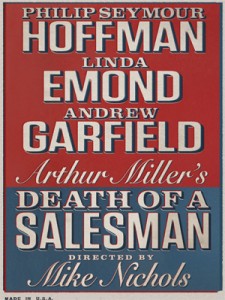 Each season, there’s a stampede of Broadway openings in the months prior to the Tony Awards. With so many shows arriving at once, journalists and theatergoers pretty much tend to focus their attention on one production at a time, in the order in which they open. Maybe that’s why I’ve yet to hear any buzz on what sounds like it’s going to be one of this spring’s most newsworthy theatrical events.
Each season, there’s a stampede of Broadway openings in the months prior to the Tony Awards. With so many shows arriving at once, journalists and theatergoers pretty much tend to focus their attention on one production at a time, in the order in which they open. Maybe that’s why I’ve yet to hear any buzz on what sounds like it’s going to be one of this spring’s most newsworthy theatrical events.
I’m referring to the fourth Broadway revival of Arthur Miller’s Death of a Salesman, a work that continues to be rated by scholars, critics, and audiences as holding a worthy place among the greatest and most influential American plays ever written. Because of the subject matter — basically, the dark side of the American dream — it can be argued that Salesman is our country’s quintessential dramatic work. (One of the few other plays that can be mentioned in the same breath is Tennessee Williams’ A Streetcar Named Desire, which will also return to Broadway before the season is out.)
Death of a Salesman has had an honored history since the epoch-making original production in 1949, with Lee J. Cobb in a legendary performance as the central character, Willy Loman. I’m a little too young to have seen that one, but I caught all of the revivals. The first was at Circle in the Square in 1975, with George C. Scott as Willy and the recently deceased James Farentino as his angst-filled son, Biff — but Scott was out the day I attended because of food poisoning, damn my luck! Next came an excellent 1984 production with Dustin Hoffman as Willy, John Malkovich as Biff, Kate Reid as Willy’s long-suffering wife, Linda, and Stephen Lang as his other son, Happy. Even better was the most recent revival, in 1999, with Brian Dennehy as Willy (a role he seemed born to play), Kevin Anderson as Biff, and Elizabeth Franz in a heartbreaking performance as Linda.
The property has received several film and television adaptations, including one with Cobb and one with Hoffman. But you’ve never really seen Death of a Salesman until you’ve seen it live on stage. Now you have another golden opportunity: The production set to open at the Barrymore Theatre on March 15 is headlined by another great Hoffman, Academy Award winner and two-time Tony Award nominee Philip Seymour Hoffman, as Willy, in the company of rising movie star Andrew Garfield as Biff and the highly respected stage veteran Linda Emond as Linda. Their director is Mike Nichols, who started out in the 1950s as a brilliant comedy writer and performer (in partnership with the equally brilliant Elaine Maye) before going on to tremendous success as a director and producer on Broadway (The Odd Couple, Annie, Spamalot) and in Hollywood (Who’s Afraid of Virginia Woolf?, The Graduate, Working Girl).
With such starry names on the marquee, the new Salesman will undoubtedly sell tons of tickets no matter what. But it will be interesting to see how it turns out from an artistic standpoint, given that some of the casting seems a bit off in terms of the ages of the actors vis-a-vis the characters. Hoffman is 44. which is youngish for “tired to the death” Willy Loman — especially nowadays, when 40 is the new 30. (Yes, the play was written in 1949, but this is often an issue when classics are revived.) As for Garfield, he’s 28. That’s about right for Biff, who finds himself increasingly disillusioned as his youth begins to slip away, but the actor reads younger — so much so that he was completely believable as a Harvard undergraduate in The Social Network. (By the way, his next big role is Peter Parker in Spider-Man, which Garfield probably wouldn’t have landed if he looked like he’s pushing 30.)
Ultimately, of course, such considerations may not matter at all. If Hoffman and Garfield are at the top of their form in Salesman, most people won’t give a fig that they’re not 100 percent perfectly cast. It’s a fairly safe bet that this show will be a huge box office hit whether or not the reviews are raves.
